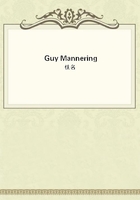
第70章
The active bustle of the mistress (so she was called in the kitchen, and the gudewife in the parlour) had already signed the fate of a couple of fowls, which, for want of time to dress them otherwise, soon appeared reeking from the gridiron-or brander, as Mrs. Dinmont denominated it. A huge piece of cold beef-ham, eggs, butter, cakes, and barley-meal bannocks in plenty, made up the entertainment, which was to be diluted with home-brewed ale of excellent quality, and a case-bottle of brandy. Few soldiers would find fault with such cheer after a day's hard exercise, and a skirmish to boot; accordingly Brown did. great honour to the eatables. While the gudewife partly aided, partly instructed, a great stout servant girl, with cheeks as red as her top-knot, to remove the supper matters, and supply sugar and hot water (which, in the damsel's anxiety to gaze upon an actual live captain, she was in some danger of forgetting), Brown took an opportunity to ask his host whether he did not repent of having neglected the gipsy's hint.
"Wha kens?" answered he;" they're queer deevils;--maybe I might just have 'scaped ae gang to' meet the other. And yet I'll no say that neither; for if that randy wife was coming to Charlies-hope, she should have a pint bottle o' brandy and a pound o' tobacco to wear her through the winter. They're queer deevils, as my auld father used to say-they're warst where they're warst guided. After a', there's baith guid and ill about the gipsies."This, and some other desultory conversation, served as a "Ishoeing-horn" to draw on another cup of ale and another cheerer, as Dinmont termed it in his country phrase, of brandy-and-water. Brown then resolutely declined all further conviviality for that evening, pleading his own weariness and the effects of time skirmish--being well aware that it would have availed nothing to have remonstrated with his host on the danger that excess might have occasioned to his own raw wound and bloody coxcomb. A very small bedroom, but a very clean bed, received the traveller, and the sheets made good the courteous vaunt of the hostess, "that they would be as pleasant as he could find ony gate, for they were washed wi' the fairy-well water, and bleached on the bonny white gowans, and bittled [*Beaten with wooden pestle.] by Nelly and herself, and what could woman, if she was a queen, do mair for them?"They indeed rivalled snow in whiteness, and had, besides, a pleasant fragrance from the manner in which they had been bleached. Little Wasp, after licking his master's hand to ask leave, couched himself on the coverlet at his feet; and the traveller's senses were soon lost in grateful oblivion.
CHAPTER XXV.
--Give ye, Britons then Your sportive fury, pitiless to pour Loose on the nightly robber of the fold. Him from his craggy winding haunts unearth'd, Let all the thunder of the chase pursue.
THOMSON'S Seasons.
Brown rose early in the morning, and walked out to look at the establishment of his new friend. All was rough and neglected in the neighbourhood of the house;--a paltry garden, no pains taken to make the vicinity dry or comfortable, and a total absence of all those little neatnesses which give the eye so much pleasure in looking at an English farm-house. There were, notwithstanding, evident signs that this arose only from want of taste, or ignorance, not from poverty, or the negligence which attends it. On the contrary, a noble cow-house, well filled with good milk-cows, a feeding-house, with ten bullocks of the most approved breed, a stable, with two good teams of horses, the appearance of domestics, active, industrious, and apparently contented with their lot; in a word, an air of liberal though sluttish plenty indicated the wealthy farmer. The situation of the house above the river formed a gentle declivity, which relieved the inhabitants of the nuisances that might otherwise have stagnated around it. At a little distance was the whole band of children, playing and building houses with peats around a huge doddered oak-tree, which was called Charlie's Bush, from some tradition respecting an old freebooter who had once inhabited the spot. Between the farm-house and the hill-pasture was a deep morass, termed in that country a slack--it had once been the defence of a fortalice, of which no vestiges now remained, but which was said to have been inhabited by the same doughty hero we have now alluded to. Brown endeavoured to make some acquaintance with the children, but "the rogues fled from him like quicksilver"--though the two eldest stood peeping when they had got to some distance. The traveller then turned his course towards the hill, crossing the foresaid swamp by a range of stepping-stones, neither the broadest nor steadiest that could be imagined. He had not climbed far up the hill when he met a man descending.
He soon recognised his worthy host, though a maud, as it is called, or a gray shepherd's-plaid, supplied his travelling jockey-coat, and a cap, faced with wild-cat's fur, more commodiously covered his bandaged head than a hat would have done. As he appeared through the morning mist, Brown, accustomed to judge of men by their thews and sinews, could not help admiring his height, the breadth of his shoulders, and the steady firmness of his step. Dinmont internally paid the same compliment to Brown, whose athletic form he now perused somewhat more at leisure than he had done formerly. After the usual greetings of the morning, the guest inquired whether his host found any inconvenient consequences from the last night's affray.
"I had maist forgotten't," said the hardy Borderer but I think this morning, now that I am fresh and sober, if you and I were at the Withershin's Latch, wi' ilka ane a gude oak souple in his hand, we wadna turn back, no for half a dizzen o' yon scaff-raff."[*Rabble.]